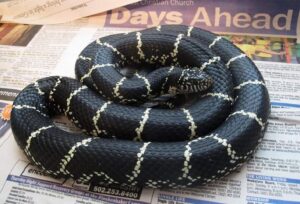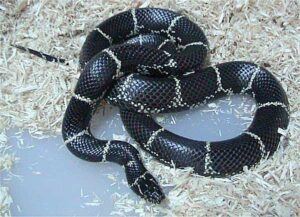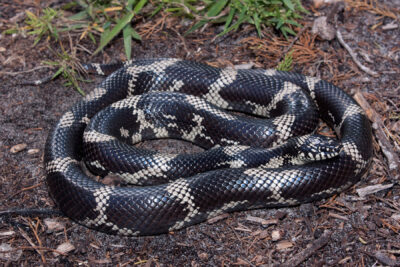King snakes are a popular choice among reptile enthusiasts for their striking appearance and relatively docile nature. However, if you’re considering owning one or have encountered a king snake in the wild, you might be wondering, Do king snakes bite?
Yes, king snakes can bite, but they usually only bite as a defensive response when they feel threatened or cornered. In general, king snakes are relatively docile and rarely bite unless they perceive a threat. However, their bite is non-venomous and typically not dangerous to humans. With proper handling and care, king snakes can be great pets for reptile enthusiasts.
Understanding King Snakes

King snakes are a fascinating species of non-venomous snakes found primarily in North and Central America. Here are some key points to help you understand them better:
- Species and Varieties: There are several species of king snakes, with the most common being the Eastern king snake, California king snake, and Mexican king snake. They belong to the genus Lampropeltis.
- Physical Appearance: King snakes are known for their striking appearance. They typically have shiny scales with various patterns, including bands or stripes of black, brown, yellow, or white. However, their appearance can vary depending on the species and locality.
- Habitat: King snakes are found in a variety of habitats, including forests, grasslands, deserts, and even urban areas. They are adaptable and can thrive in diverse environments.
- Diet: King snakes are constrictors, meaning they kill their prey by coiling around it and squeezing until it suffocates. They eat a variety of prey, including rodents, birds, lizards, and other snakes, including venomous ones. In fact, they are immune to the venom of most North American venomous snakes, making them formidable predators.
- Behavior: King snakes are generally solitary animals, except during the breeding season. They are primarily nocturnal, hunting for prey during the night. They are also excellent climbers and are known to climb trees and shrubs in search of prey.
- Reproduction: King snakes reproduce sexually, with females laying eggs. The number of eggs laid varies depending on the species and the size of the female. After laying their eggs, the females provide no further care to their offspring.
- Predators and Defense: While king snakes are predators themselves, they also have predators, including larger snakes, birds of prey, and mammals. When threatened, king snakes will often hiss, vibrate their tails, and may even release a foul-smelling musk as a defense mechanism.
Overall, king snakes play an essential role in their ecosystems by helping to control populations of small mammals and other reptiles. They are also popular among reptile enthusiasts due to their striking appearance and relatively docile nature.
Do king snakes bite?
Yes, king snakes are capable of biting, like all snakes. However, they are not considered aggressive and will generally only bite if they feel threatened or are mishandled.
Here are a few points to understand about king snake bites:
- Defensive Behavior: When threatened, a king snake’s first line of defense is usually to try to escape. If they feel cornered or threatened, they may strike as a defensive measure.
- Bite Characteristics: King snake bites are generally not dangerous to humans. They are non-venomous, so their bites are not harmful in terms of injecting venom. However, like any bite, it can cause some pain, and there is a risk of infection if the wound is not properly cleaned.
- Rare Occurrence: Bites from king snakes are relatively rare because they are not aggressive and typically avoid confrontations with humans. Most bites occur when people mishandle the snake or accidentally step on it.
- Handling Precautions: When handling a king snake or any snake, it’s essential to do so gently and confidently to avoid startling the snake. Grabbing a snake suddenly or roughly can cause it to feel threatened and may result in a defensive bite.
- Relatively Docile Nature: Overall, king snakes are considered relatively docile and are often kept as pets. With proper handling and care, they can become quite tame and are unlikely to bite their owners.
If you ever encounter a king snake in the wild or as a pet, it’s essential to treat it with respect and caution. As long as you do not pose a threat to the snake, it is unlikely to bite. If you do get bitten, it’s crucial to remain calm and seek medical attention if necessary, especially if the bite breaks the skin and there is a risk of infection.
Defensive Behavior of King Snakes
King snakes are known for their defensive behavior, which can vary depending on the situation and the individual snake’s temperament. Here are some common defensive behaviors exhibited by king snakes:
- Hissing: When threatened, king snakes may hiss loudly as a warning to potential predators or perceived threats. Hissing is often accompanied by the snake coiling its body and raising its head to appear larger and more intimidating.
- Striking: If the threat persists, king snakes may strike at the perceived threat. They usually strike with a closed mouth as a warning rather than attempting to bite.
- Musking: King snakes may release a foul-smelling musk from their cloaca when they feel threatened. This musk can deter predators and is often accompanied by other defensive behaviors.
- Curling into a ball: In some cases, king snakes may curl into a tight ball with their head tucked inwards to protect themselves from potential threats.
- False strikes: Some king snakes may perform “false strikes” where they strike without actually making contact with the perceived threat. This behavior is often used as a bluff to scare away predators.
- Vibrating tail: In certain situations, king snakes may vibrate their tail against the ground, creating a sound that mimics a rattlesnake’s rattle. This behavior is a form of mimicry and is used to intimidate predators.
It’s important you know that king snakes are generally docile and will only exhibit defensive behavior when they feel threatened or cornered. In most cases, they will attempt to flee from a potential threat rather than engage in defensive behavior.
Factors That Influence King Snakes Biting

King snakes are generally docile and non-aggressive, but they may bite in certain situations, especially if they feel threatened or cornered. Several factors can influence a king snake to bite:
- Feeding Response: One of the most common reasons for king snakes to bite is when they mistake a hand or another object for food. This usually happens during feeding time when the snake is in hunting mode.
- Handling Stress: King snakes may bite if they feel threatened or stressed while being handled. Rough handling or sudden movements can startle the snake, causing it to defend itself by biting.
- Protecting Territory: King snakes may bite if they feel their territory is being invaded. This is more common in wild king snakes than those kept as pets.
- Mistaking for Predators: If they feel threatened by a larger animal or human, king snakes may bite in self-defense.
- Hunger: A hungry king snake may bite if it mistakes fingers or hands for food. This is more likely to occur if the snake has not been fed recently.
- Health Issues: Sometimes, if a king snake is sick or in pain, it may become more defensive and prone to biting.
- Mating Season: During mating season, male king snakes may become more territorial and aggressive, increasing the likelihood of biting.
To minimize the risk of being bitten by a king snake, it’s essential to handle them gently, avoid sudden movements, and be mindful of their feeding schedule. Additionally, regular feeding and ensuring they are in good health can help reduce their stress levels and the likelihood of defensive behavior.
Are King Snake Bites Dangerous?
King snakes are non-venomous reptiles, meaning they do not produce venom. Therefore, if a king snake bites a human, there is no venom injected into the person’s body. While the bite may be painful and cause some localized swelling and irritation, it is generally not dangerous.
The severity of the bite can vary depending on the size of the snake and the circumstances of the bite. However, serious complications from king snake bites are rare, and most people do not require medical treatment beyond basic wound care.
If bitten by a king snake, it’s important to clean the wound thoroughly with soap and water to reduce the risk of infection. Additionally, it’s a good idea to monitor the wound for any signs of infection, such as increasing redness, swelling, or discharge. In most cases, however, there is no need for immediate medical attention.
How to Avoid Being Bitten by a King Snake
While king snakes are generally non-aggressive towards humans, it’s still important to take precautions to avoid being bitten. Here are some tips to help you avoid being bitten by a king snake:
- Give them space: King snakes, like most snakes, prefer to avoid humans and will usually only bite if they feel threatened. Give them plenty of space and avoid handling them unless necessary.
- Watch your step: When hiking or walking in areas where king snakes are known to live, watch where you step to avoid accidentally stepping on one.
- Wear appropriate clothing: If you’re working in areas where king snakes are present, wear long pants, closed-toe shoes, and gloves to protect yourself.
- Use caution when handling: If you need to handle a king snake, do so gently and with caution. Avoid sudden movements and handle the snake with confidence to reduce the likelihood of it feeling threatened.
- Be aware of their habits: King snakes are often found in wooded areas, grasslands, and near water sources. Be particularly cautious in these types of environments.
- Educate yourself: Learn to recognize the signs that a king snake may be feeling threatened, such as hissing, coiling, or striking. If you see these signs, back away slowly and give the snake plenty of space.
By following these tips, you can reduce the risk of being bitten by a king snake and coexist safely with these fascinating reptiles.
Conclusion
Do King Snakes Bite? While king snakes are non-venomous and generally not aggressive towards humans, they may bite if they feel threatened. However, with proper precautions such as giving them space, wearing protective clothing, and handling them with caution, the risk of being bitten by a king snake can be greatly minimized. Overall, while king snake bites are not typically dangerous, it’s important to treat them with respect and caution.

